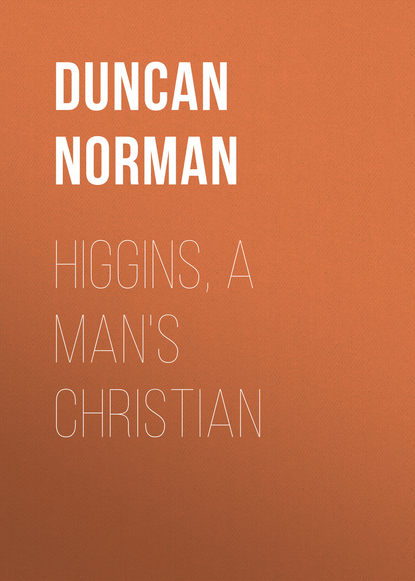По всем вопросам обращайтесь на: info@litportal.ru
(©) 2003-2024.
✖
Higgins, a Man's Christian
Настройки чтения
Размер шрифта
Высота строк
Поля
“You’d hardly believe it,” said the Pilot, “but we cashed that big check right in Jake Boore’s saloon. I wouldn’t have it any other way, and neither would Jonesy. In we went, boys, brave as lions; and when Jake Boore passed over the money Jonesy put it in his pocket. Drink? Not he! Not a drop would he take. They tried all the tricks they knew, but Jonesy wouldn’t fall to them. They even put liquor under his nose; and Jonesy let it stay there, and just laughed. I tell you boys, it was fine! It was great! Jonesy and I stuck it out night and day together for two days; and then I put Jonesy aboard train, and Jonesy swore he’d never set foot in Deer River again. He was going South, somewhere, to see–somebody.”
It was doubtless the grace of God, after all, that got the cook through: if not the grace of God in the cook’s heart, then in the Pilot’s.
VII
ROBBING THE BLIND
It it a perfectly simple situation. There are thirty thousand men-more or less of them, according to the season–making the wages of men in the woods. Most of them accumulate a hot desire to wring some enjoyment from life in return for the labor they do. They have no care about money when they have it. They fling it in gold over the bars (and any sober man may rob their very pockets); they waste in a night what they earn in a winter–and then crawl back to the woods. Naturally the lumber-towns are crowded with parasites upon their lusts and prodigality–with gamblers and saloon-keepers and purveyors of low passion. Some larger capitalists, more acute and more acquisitive, of a greed less nice – profess the three occupations at once. They are the men of real power in the remoter communities, makers of mayors and chiefs of police and magistrates–or were until Higgins came along to dispute them. And their operations have been simple and enormously profitable–so easy, so free from any fear of the law, that I should think they would (in their own phrase) be ashamed to take the money. It seems to be no trouble at all to abstract a drunken lumber-jack’s wages.
It takes a big man to oppose these forces–a big heart and a big body, and a store of hope and courage not easily depleted. It takes, too, a good minister; it takes a loving heart and a fist quick to find the point of the jaw to preach the gospel after the manner of Higgins. And Higgins conceives it to be one of his sacred ministerial duties to protect his parishioners in town. Behind the bunk-houses, in the twilight, they say to him: “When you goin’ t’ be in Deer River, Pilot? Friday? All right. I’m goin’ home. See me through, won’t you?” Having committed themselves in this way, nothing can save them from Higgins–neither their own drunken will (if they escape him for an interval) nor the antagonism of the keepers of places. This is perilous and unscholarly work; systematic theology has nothing to do with escorting through a Minnesota lumber-town a weak-kneed boy who wants to take his money home to his mother in Michigan.
Once the Pilot discovered such a boy in the bar-room of a Bemidji saloon.
“Where’s your money?” he demanded.
“’N my pocket.”
“Hand it over,” said the Pilot.
“Ain’t going to.”
“Yes, you are; and you’re going to do it quick. Come out of this!”
Cowed by these large words, the boy yielded to the grip of Higgins’s big hand, and was led away a little. Then the bartender leaned over the bar. A gambler or two lounged toward the group. There was a pregnant pause.
“Look here, Higgins,” said the bartender, “what business is this of yours, anyhow?”
“What business–of mine?” asked the astounded Pilot.
“Yes; what you buttin’ in for?”
“This,” said Higgins, “is my job!”
The Pilot was leaning wrathfully over the bar, his face thrust belligerently forward, alert for whatever might happen. The bartender struck at him. Higgins had withdrawn. The bartender came over the bar at a bound. The preacher caught him on the jaw in mid-air with a stiff blow, and he fell headlong and unconscious. They made friends next day–the boy being then safely out of town. It is not hard for Higgins to make friends with bartenders. They seem to like it; Higgins really does.
It was in some saloon of the woods that the watchful Higgins observed an Irish lumber-jack empty his pockets on the bar and, in a great outburst of joy, order drinks for the crowd. The men lined up; and the Pilot, too, leaned over the bar, close to the lumber-jack. The bartender presently whisked a few coins from the little heap of gold and silver. Higgins edged nearer. In a moment, as he knew–just as soon as the lumber-jack would for an instant turn his back–the rest of the money would be deftly swept away.
The thing was about to happen, when Higgins’s big hand shot out and covered the heap.
“Pat,” said he, quietly, “I’ll not take a drink. This,” he added, as he put the money in his pocket, “is my treat.”
The Pilot stood them all off–the hangers on, the runners, the gamblers, the bartender (with a gun), and the Irish lumber-jack himself. To the bartender he remarked (while he gazed contemptuously into the muzzle of the gun) that should ever the fellow grow into the heavy-weight class he would be glad to “take him on.” As it was, he was really not worth considering in any serious way, and had better go get a reputation. It was a pity–for the Pilot (said he) was fit and able–but the thrashing must be postponed for the time.
There was no shooting.
Further to illustrate the ease with which the lumber-jack may be robbed, I must relate that last midwinter, in the office of a Deer River hotel, the Pilot was greeted with hilarious affection by a boy of twenty or thereabouts who had a moment before staggered out from the bar-room. The youngster was having an immensely good time, it seemed; he was full of laughter and wit and song–not yet quite full of liquor. It was snowing outside, I recall, and a bitter wind was blowing from the north; but it was warm and light in the office–bright, and cosy, and companionable: very different, indeed, from the low, stifling, crowded, ill-lit bunk-houses of the camps, nor was his elation like the weariness of those places. There were six men lying drunk on the office floor-in grotesque attitudes, very drunk, stretched out and snoring where they had fallen.
“Boy,” demanded the Pilot, “where’s your money?”
The young lumber-jack said that it was in the safe-keeping of the bartender.
“How much you got left?”
“Oh, I got lots yet,” was the happy reply.
Presently the boy went away, and presently he reeled back again, and put a hand on the Pilot’s shoulder.
“Near all in?” asked the Pilot.
“I came here yesterday morning with a hundred and twenty-three dollars,” said the boy, very drunkenly, “and I give it to the bartender to keep for me, and I’m told I got two-thirty left.”
He was quite content; but Higgins knew that the money of which they were robbing him was needed at his home, a day’s journey to the east of Deer River.
There is no pleasure thereabout (they say) but the spree, and the end of the spree is the snake-room for by far the most of the merry-makers–r a penniless condition for all–pneumonia for many–and for the survivors a beggared, reeling return to the hard work of the woods.
Higgins is used to picking over the bodies of drunken men in the snake-room heaps–of entering sadly, but never reluctantly (he said), in search of men who have been sorely wounded in brawls, or are taken with pneumonia, or in whom there remains hope of regeneration. He carries them off on his back to lodgings–or he wheels them away in a barrow–and he washes them and puts them to bed and (sometimes angrily) restrains them until their normal minds return. It has never occurred to him, probably, that this is an amazing exhibition of primitive Christian feeling and practice. He may have thought of it, however, as a glorious opportunity for service, for which he should devoutly and humbly give thanks to Almighty God.
VIII
TOUCHING PITCH
Not long ago Bemidji was what the Pilot calls “the worst town on the map.” It was indescribably lawless and vicious. An adequate description would be unprintable. The government–the police and magistrates–was wholly in the hands of the saloon-keeping element. It was a thoroughly noisome settlement. The town authorities laughed at the Pilot; the state authorities gently listened to him and conveniently forgot him, for political reasons. But he was determined to cleanse the place of its established and flaunting wickednesses. He organized a W. C. T. U.; and then–“Boys,” said he to the keepers of places, “I’m going to clean you out. I want to be fair to you–and so I tell you. Don’t you ever come sneaking up to me and say I didn’t give you warning!” They laughed at him when he stripped off his coat and got to work. In the bar-rooms the toast was, “T’ Higgins–and t’ hell with Higgins!” and down went the red liquor. But when the fight was over, when the shutters were up for good–so had he compelled the respect of these men–they came to the preacher, saying: “Higgins, you gave us a show; you fought us fair–and we want to shake hands.”
“That’s all right, boys,” said Higgins.
“Will you shake hands?”
“Sure, I’ll shake hands, boys!”
Jack Worth–that notorious gambler and saloon-keeper of Bemidji–quietly approached Higgins.
“Frank,” said he, “you win; but I’ve no hard feelings.”
“That’s all right, Jack,” said Higgins.
The Pilot remembered that he had sat close to the death-bed of the young motherless son of this same Jack Worth in the room above the saloon. They had been good friends–the big Pilot and the boy. And Jack Worth had loved the boy in a way that only Higgins knew. “Papa,” said the boy, at this time, death being then very near, “I want you to promise me something.” Jack Worth listened. “I want you to promise me, papa,” the boy went on, “that you’ll never drink another drop in all your life.” Jack Worth promised, and kept his promise; and Jack Worth and the preacher had preserved a queer friendship since that night.
“Jack,” said the Pilot, now, “what you going to do?”
“I don’t know, Frank.”
“Aren’t you going to quit this dirty business.”
“I ran a square game in my house, and you know it,” the gambler replied.
“That’s all right, Jack,” Higgins said; “but look here, old man, isn’t little Johnnie ever going to pull you out of this?”
“Maybe, Frank,” was the reply. “I don’t know.”











